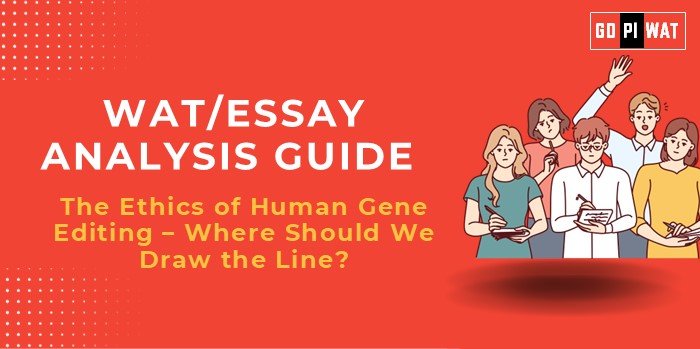📋 Written Ability Test (WAT)/Essay Analysis Guide: The Ethics of Human Gene Editing – Where Should We Draw the Line?
🌐 Understanding the Topic’s Importance
Gene editing intersects with medicine, ethics, and economics, making it a critical topic for B-school discussions on innovation and responsibility.
📝 Effective Planning and Writing
- ⏳ Time Allocation:
- Planning: 5 minutes.
- Writing: 20 minutes.
- Review: 5 minutes.
✨ Introduction Techniques for Essays
1. Contrast Approach
“While gene editing offers life-saving possibilities, it raises profound ethical questions about humanity’s future.”
2. Solution-Based Introduction
“The promise of curing genetic disorders must be balanced against ethical safeguards to ensure equitable outcomes.”
🏗️ Structuring the Essay Body
1. Achievements
- 🩺 Medical Breakthroughs: Use examples like CRISPR-based Sickle Cell Disease cure.
2. Challenges with Comparative Analysis
- ⚖️ Ethical Dilemmas: Highlight concerns such as the designer baby dilemma, referencing China’s CRISPR experiments.
3. Future Outlook
- 🌍 Global Standards: Recommend global ethical frameworks and equitable access strategies.
🔎 Analyzing Successes and Shortcomings in Gene Editing
✅ Key Achievements
- 🩺 Medical Breakthroughs:
- Gene editing has successfully cured certain genetic diseases, such as Sickle Cell Anemia (CRISPR trials, 2021).
- CRISPR-based therapies have demonstrated a 77% disease control rate in specific cancer treatments, signaling a revolution in precision medicine.
- 🌱 Agricultural Innovations: Enhanced crop yields and resistance to pests through genome editing have bolstered food security in regions prone to agricultural challenges.
- 🔬 Research Advancements: Techniques like CRISPR-Cas9 have simplified gene modification, reducing costs and making genetic research more accessible.
- 📜 Ethical Frameworks: The WHO’s 2021 Human Genome Editing Registry reflects an increased focus on global transparency and accountability.
⚠️ Ongoing Challenges
- ⚖️ Ethical Concerns:
- The potential for “designer babies” and the ethical implications of altering human traits pose moral dilemmas.
- Concerns about inequality arise as only affluent populations may initially access advanced gene-editing therapies.
- 🔍 Safety Risks: CRISPR-based edits sometimes result in off-target mutations, creating uncertainties about long-term effects on human health.
- 🌍 Regulatory Fragmentation: A lack of global consensus leads to disparities in gene-editing laws, with some nations permitting ethically controversial practices, such as germline editing.
- 👥 Public Distrust: Cases like the unauthorized CRISPR baby experiment in China (2018) have fueled skepticism and demands for stricter oversight.
🌍 Global Context
- 🇨🇳 China’s Rapid Advancements: While leading in research and application, ethical violations (e.g., CRISPR babies) highlight the dangers of inadequate regulation.
- 🇬🇧 UK’s Stringent Oversight: The UK has implemented strict guidelines for somatic gene editing, ensuring ethical and safe research environments.
- 🇺🇸 US Research Leadership: With strong funding and innovation, the US is at the forefront of somatic cell therapy trials but faces debates over accessibility and cost.
📄 Concluding Effectively
1. Balanced Approach
“Gene editing’s promise must align with humanity’s ethical compass, ensuring its benefits are universally shared.”
2. Global Example-Based Conclusion
“Lessons from China’s regulatory lapses and the UK’s controlled trials illustrate the need for global ethical standards.”
💡 Recommendations for Sustainable Progress
- 🌍 Global Ethical Guidelines: Establish global standards via WHO or UNESCO.
- 🤝 Equitable Access: Ensure that gene editing technologies are accessible to all populations.
- 🔍 Transparency in Research: Promote open and accountable scientific practices.
📚 Sample Short Essays
1. Balanced Perspective
“Gene editing symbolizes humanity’s greatest hope and deepest ethical challenge. Striking the right balance is imperative.”
2. Solution-Oriented
“Effective regulations and equitable access can unlock gene editing’s potential without compromising ethical integrity.”
3. Global Comparison
“China’s lapses and the UK’s stringent oversight show that global collaboration is vital for ethical gene editing.”


